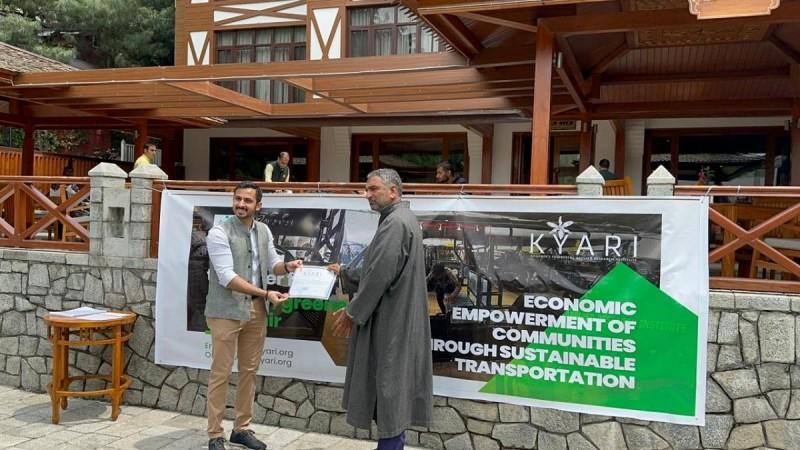
To combat pollution in cities, e-rickshaws were introduced in different parts of the Union Territory of Jammu and Kashmir but drivers of these vehicles are facing hardships.
Protests by e-rickshaw drivers have become routine affairs as authorities have imposed restrictions on their movements in many places.
For the last couple of days, e-rickshaw drivers in Srinagar have been protesting against the ban on their vehicles' entry to the main routes.
According to e-rickshaw drivers, traffic authorities are not allowing them to enter the main routes, and the traffic authorities seized many vehicles without any reason.
The poor drivers demanded either permission to ply on main routes or they should be allocated dedicated routes so that they could also earn their livelihood.

Arshid Abbas, President of the All Kashmir E-Rickshaw Association regretted that the drivers were being denied access to the Karan Nagar area of Srinagar city. He claimed that this area is included in the permissible route plan approved by the Regional Transport Office (RTO).
The drivers pointed out that if they were not allowed to carry passengers within the city, then what was the reason for launching e-rickshaws earlier in Srinagar?
Auto drivers opposing movement of e-rickshaws on main routes
Since the introduction of e-rickshaws, regular auto drivers have opposed the movement of these vehicles in a "haphazard movement" in the city.
They urged the RTO Kashmir to allocate proper routes for them.
Operators of auto-rickshaws pointed out that their vehicles have been operating on Srinagar's streets since 1975. They further said that they have been facing challenges after the introduction of e-rickshaws for the last two years.
Auto-operators argued that initially number of these e-rickshaws was very small, and the authorities had assured that e-rickshaws would only operate on routes with limited bus and other connectivity services.
They further expressed that now these e-rickshaws are present everywhere, harming their business.
Unemployed youth purchase e-rickshaws to earn their livelihood
To earn their livelihood, many unemployed youth of Jammu and Kashmir purchased e-rickshaws after introducing these vehicles.
While highlighting their conditions, operators of e-rickshaws highlighted their financial struggles as they had taken loans to purchase e-rickshaws, which constituted their sole source of income.
They expressed concerns that failure to make loan payments could result in their vehicles being seized by banks.
E-rickshaws introduced on Srinagar roads in 2020
Amid the rising pollution resulting from growing traffic in Srinagar, the authorities have decided to introduce e-rickshaws in several parts of Srinagar city in 2020.
To begin with, these battery-driven rickshaws were allowed to run on a trial basis for five days during which experts evaluated their capacity, features, and other necessary factors before giving a green signal.
Before formally introducing these vehicles, authorities checked the claims made by manufacturers about the capacity of these vehicles.
The introduction of e-rickshaws has significantly improved passenger services, especially in connecting uptown areas with the interior parts of the city.
People are opting for e-rickshaws due to their affordability and comfort, which has led to a surge in their popularity and subsequent increase in purchases.
Prefer choice for passengers and drivers
E-rickshaws are not only cost-effective for passengers but also environmentally friendly, as they produce no pollution. The affordability and efficiency of e-rickshaws, with a quick charge time of just two hours for a 200-kilometer range, have made them a preferred choice for both passengers and drivers alike. Sales outlets offering fully charged battery replacements are likely to further boost the adoption of e-rickshaws among auto-rickshaw owners in Srinagar.
The rising popularity of e-vehicles, not just e-rickshaws, is expected to reshape the automobile industry in the coming years, with increasing demand and interest from consumers. This trend is beneficial for new entrepreneurs entering the e-vehicle business, particularly in regions like Jammu & Kashmir, where interest in e-vehicles is growing.
In the long term, the cost-effectiveness and popularity of e-rickshaws may lead to their widespread adoption, eventually replacing fuel-driven auto-rickshaws in major cities like Srinagar and Jammu, as well as towns across the Kashmir Valley and Jammu division. This transition could not only transform passenger services but also alleviate traffic congestion and reduce the environmental impact of transportation.
Under the Srinagar Smart City project, at least 20 electric buses are already running on different routes. These buses are eco-friendly. The air and noise-pollution-free electric buses are running on separate routes in both the Jammu and Srinagar regions, having the capacity to run up to 150 kilometers with one full charge.








